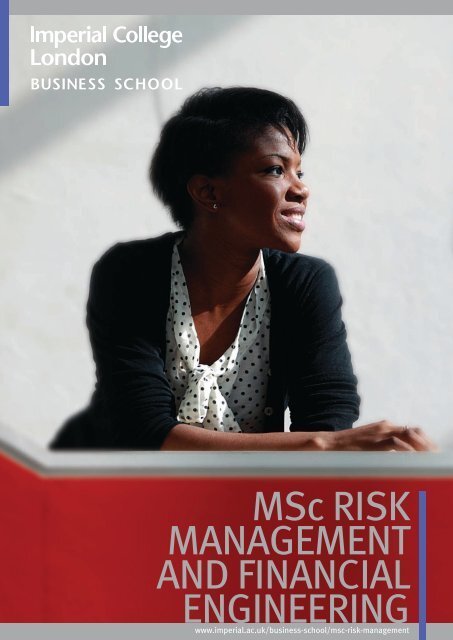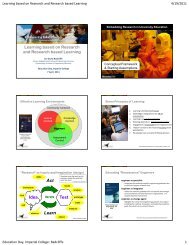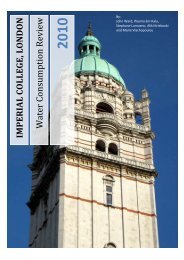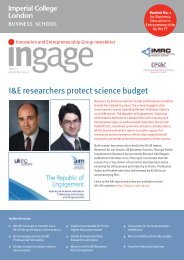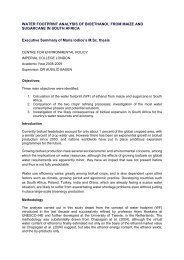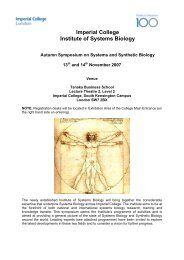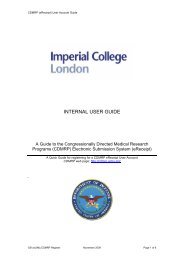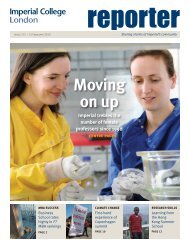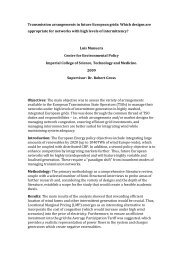MSc RISK MANAGEMENT AND FINANCIAL ENGINEERING
MSc RISK MANAGEMENT AND FINANCIAL ENGINEERING
MSc RISK MANAGEMENT AND FINANCIAL ENGINEERING
You also want an ePaper? Increase the reach of your titles
YUMPU automatically turns print PDFs into web optimized ePapers that Google loves.
<strong>MSc</strong> <strong>RISK</strong><br />
<strong>MANAGEMENT</strong><br />
<strong>AND</strong> <strong>FINANCIAL</strong><br />
<strong>ENGINEERING</strong><br />
www.imperial.ac.uk/business-school/msc-risk-management
“The programme’s<br />
intellectual energy is<br />
challenging. The work was<br />
academically rigorous,<br />
whilst also providing the<br />
hands-on technical skills<br />
I am now using in my role<br />
at J.P. Morgan. Tackling<br />
real-world scenarios<br />
with faculty, visiting<br />
practitioners and fellow<br />
students inspired me to<br />
come up with new and<br />
creative ideas.”<br />
Lola Adeyomo, <strong>MSc</strong> RMFE 2010<br />
Emerging Markets Rates Exotics Trading Desk,<br />
J.P.Morgan<br />
2 <strong>MSc</strong> Risk Management and Financial Engineering
<strong>MSc</strong> Risk Management<br />
and Financial Engineering<br />
“This specialist programme is tailored to those<br />
wanting a deeper, more analytical study<br />
in finance than is found in general finance<br />
programmes. It is the most quantitativelyfocused<br />
full-time programme offered by<br />
Imperial College Business School.<br />
Developed with insight from Standard & Poor’s,<br />
the programme ensures you benefit from a unique<br />
blend of academic theory and real-world<br />
applications, so you graduate with all the<br />
quantitative skills required for a successful<br />
career in risk management.<br />
The programme is taught by a combination of our<br />
outstanding faculty and industry practitioners<br />
from the City, providing a good mix of the latest<br />
research findings from the Business School’s<br />
Risk Management Lab and unique industry<br />
developments from practitioners working in<br />
the field of risk management. Throughout the<br />
programme, you will be exposed to the latest<br />
strategies for managing risk, and you will be able<br />
to learn from other industry speakers who present<br />
regularly at the Business School.<br />
The programme brings together students with different<br />
backgrounds, interests and experience. This diversity,<br />
combined with the international spread of students,<br />
makes for a lively and stimulating learning environment.<br />
Our <strong>MSc</strong> Risk Management and Financial Engineering<br />
is suitable for high-calibre, ambitious and<br />
technically-minded students who want to study<br />
in London and work in the highly competitive, yet<br />
rewarding financial services sector.”<br />
Professor Andrea Buraschi, Programme Director<br />
(external affairs) and Professor in Finance<br />
The Imperial advantage<br />
• Part of Imperial College London: become a student of one of the world’s most respected research-led<br />
universities, and have access to a highly influential alumni network<br />
• Diversity: you’ll mix with students of the highest calibre, from a wide range of different cultural and<br />
geographical backgrounds<br />
• Putting theory into practice: learn from leading practitioners and world-class academics how to put the<br />
latest academic thinking and business strategies into practice<br />
• Career development: benefit from a dedicated careers service that will help you present yourself with<br />
confidence to the world’s top employers<br />
• London location: you’ll be at the heart of one of the world’s leading cultural and financial centres<br />
• Reputation: the Imperial name will open doors for you across the world<br />
<strong>MSc</strong> Risk Management and Financial Engineering<br />
3
Gain a reputation<br />
for excellence<br />
Succeed in your <strong>MSc</strong> at Imperial College Business School and you become a graduate of one of<br />
the world’s leading universities, with a global reputation for excellence in entrepreneurship,<br />
innovation, quantitative finance and health management. Our internationally-recognised faculty<br />
have strong links with industry, so they can bring theory alive through case studies drawn from<br />
their experience as business consultants. You will learn from their ground-breaking research,<br />
benefit from the Business School’s close collaboration with other Imperial College departments<br />
and institutes, and graduate with a command of the latest thinking.<br />
The focus of the programme is practical. You will<br />
apply what you learn through group discussions<br />
and project work, building your technical skills<br />
and confidence, improving your decision-making<br />
ability and enhancing your value to an employer.<br />
This combination of academic excellence and<br />
real-world relevance makes our graduates<br />
attractive to employers from every sector.<br />
We provide a friendly, supportive environment<br />
where you will develop the confidence to share<br />
insights with other high-achieving students from<br />
culturally diverse backgrounds. Project work in small<br />
groups ensures you master the theories, knowledge<br />
and skills taught throughout the course, and gives<br />
you an excellent foundation in the management<br />
expertise you will need in the next stage of your<br />
career. Working in groups is an important part of<br />
our approach, because it encourages collaborative<br />
skills, generates outstanding results and builds<br />
your personal and professional networks.<br />
Our location, in South Kensington, brings<br />
you to the cultural heart of London, with<br />
many of the world’s most famous museums,<br />
art galleries, parks and restaurants on your<br />
doorstep. You are also close to the City, London’s<br />
financial and business centre, home to the<br />
headquarters of many global organisations. One<br />
of the exciting opportunities in the programme<br />
is the chance to visit and learn from leading<br />
organisations operating in different sectors.<br />
4 <strong>MSc</strong> Risk Management and Financial Engineering
<strong>MSc</strong> Risk Management and Financial Engineering<br />
5
Shape your future:<br />
our programme<br />
This highly technical one-year, full-time programme prepares recent high-calibre graduates for<br />
careers in portfolio and risk management, financial engineering, trading, structuring, or a PhD<br />
in Finance.<br />
A solid quantitative foundation, the latest<br />
research, practical application and the broad<br />
range of topics covered make the <strong>MSc</strong> Risk<br />
Management and Financial Engineering a unique<br />
and truly inspiring experience.<br />
Pre-study courses<br />
There are some online pre-study courses that you<br />
should take before starting the programme.<br />
These may include Induction to Maths, Introduction<br />
to Finance, Accounting Primer, and Ethics and<br />
Professional Standards.<br />
Foundation courses<br />
You will study four courses in September that<br />
introduce you to the tools of modern finance and<br />
enhance your career development skills. These<br />
include Markets and Securities, Financial Modelling,<br />
The Finance Industry, and Mathematical Finance.<br />
Core and elective courses<br />
The <strong>MSc</strong> Risk Management and Financial<br />
Engineering includes five core courses, as<br />
well as a number of electives that students<br />
can select according to their particular interests<br />
and career aspirations.<br />
Additional options<br />
• Computing workshops, courses in C++<br />
• Chartered Financial Analyst (CFA)<br />
exam preparation<br />
• Reuters Academy<br />
Programme timetable<br />
Pre-study<br />
August<br />
Foundation<br />
September<br />
Autumn term<br />
October – December<br />
Spring term<br />
January – March<br />
Summer term<br />
April – June<br />
Summer<br />
July – August<br />
Pre-study<br />
courses<br />
Foundation<br />
courses<br />
Core<br />
courses<br />
Elective<br />
courses<br />
Project<br />
VBA course<br />
Please note that the programme structure is subject to change and you should check the website for the most up-to-date information.<br />
6 <strong>MSc</strong> Risk Management and Financial Engineering
“Being based in London has<br />
provided a fantastic opportunity<br />
to engage with highly successful<br />
practitioners from the City of<br />
London. Networking with guest<br />
lecturers and the alumni who<br />
attend events at the Business<br />
School has been inspirational.<br />
London is not only the financial<br />
capital of Europe, it is also a<br />
stimulating and exciting place<br />
to live and study.”<br />
Karim Taha, <strong>MSc</strong> Risk Management and Financial Engineering 2010<br />
Intern, Investment Banking Department, J.P. Morgan<br />
<strong>MSc</strong> Risk Management and Financial Engineering<br />
7
Core<br />
courses<br />
There are five core courses, plus a compulsory VBA course, that provide you with a comprehensive<br />
and systematic training in the mechanisms and techniques involved in quantitative financial<br />
modelling. Taught through lectures and quantitative case studies, you will work on real-world<br />
problems faced by financial firms using extensive data sets and computer programmes.<br />
Stochastic Calculus<br />
This course provides students with an essential<br />
understanding of stochastic calculus and its<br />
continuous-time application to finance. A balance<br />
between rigorous mathematical proofs, intuitive<br />
explanations and real-life examples of the financial<br />
industry is achieved.<br />
Financial Statistics<br />
and Advanced<br />
Financial Statistics<br />
Technical work in financial institutions frequently<br />
involves the analysis of data. These two core courses<br />
will ensure you have a solid foundation in statistical<br />
inference and econometrics, with an emphasis on<br />
the special features that are prevalent in finance and<br />
in the management of financial risks.<br />
Market Microstructure<br />
This course covers key areas of risk management<br />
which are particularly relevant in the postcrisis<br />
economy and involves liquidity and price<br />
formation on securities markets. The structure and<br />
performance of prominent real-world securities<br />
markets is described and examined using theory<br />
and evidence from the financial economics<br />
literature. Explicit attention is given to the impact of<br />
differences in trading system design and regulation,<br />
as well as to the relationship between market<br />
liquidity and asset prices.<br />
Investments and Portfolio<br />
Management<br />
This course provides you with a critical<br />
understanding of important portfolio management<br />
techniques used for investments and portfolio<br />
management by hedge funds, asset managers,<br />
investment banks and other financial institutions.<br />
VBA courses<br />
Aimed at familiarising students with the<br />
programming language Visual Basic for Applications<br />
(VBA) for Microsoft Excel, this course covers<br />
introductory and intermediate topics to equip<br />
students with the basic skills necessary to create<br />
VBA projects. This is then followed by an Advanced<br />
VBA course building on the material taught during<br />
the Basic VBA course and introducing students to<br />
more advanced programming and Excel concepts.<br />
8 <strong>MSc</strong> Risk Management and Financial Engineering
“I came to the Business School<br />
because the programme offered<br />
the combination of quantitative<br />
skills and practical application<br />
to really move my career on.”<br />
Wenying Qiu, <strong>MSc</strong> Risk Management and Engineering 2010<br />
<strong>MSc</strong> Risk Management and Financial Engineering<br />
9
Elective<br />
courses<br />
You choose five electives from the following list to deepen your knowledge and acquire<br />
practical experience.*<br />
Enterprise Risk<br />
Management<br />
An introduction to modern methods of enterprise<br />
risk management applicable to financial<br />
organisations. It analyses different types of risk and<br />
methods for measuring and managing them before<br />
examining how insurance companies and pension<br />
funds employ models that bring together different<br />
risk types in order to implement risk mitigation<br />
techniques, such as reinsurance, securitisation,<br />
or hedging.<br />
Advanced Financial<br />
Valuation<br />
Provides advanced techniques in contingent<br />
claims analysis. Valuation techniques are<br />
derived and applied for options, term structure<br />
derivatives, credit-sensitive instruments and<br />
structured products.<br />
Hedge Funds<br />
Building on the material covered in Investment<br />
Portfolio Management, this course discusses<br />
advanced portfolio management techniques,<br />
including the use of dynamic portfolio theory,<br />
derivatives and portfolio insurance. Advanced<br />
trading strategies, such as event-driven and<br />
credit derivative strategies are also covered.<br />
International Finance<br />
An introduction to key concepts and analytical<br />
tools used in the field of international finance and<br />
international macroeconomics. Topics covered<br />
are balance of payments, exchange rates, foreign<br />
debt and default, direction of capital flows, global<br />
imbalances and home bias.<br />
Private Equity and<br />
Entrepreneurial Finance<br />
Applications and tools for students interested in<br />
late-stage investments, such as Growth Capital, LBO,<br />
Mezzanine, HY and Infrastructure. You will examine<br />
the role of private equity, finance instruments<br />
and structures, and the application of these tools<br />
in company acquisition or restructuring. You will<br />
understand the role of the banks and the funds in<br />
the debt-raising process, and the financial and legal<br />
aspects of the structuring and valuation involved in<br />
executing an investment in sectors such as Energy, the<br />
Environment, Retail/Consumer Goods and Industry.<br />
Banking<br />
The first part of the course focuses on issues in<br />
financial intermediation from a microeconomic<br />
perspective: risk-sharing, bank runs, regulation<br />
and underscoring asymmetric information models.<br />
The second part analyses the dominant role of<br />
investment banks as information intermediaries.<br />
Advanced Portfolio<br />
Management<br />
A discussion of common advanced portfolio<br />
management techniques such as Bayesian<br />
portfolio optimisation, derivatives and portfolio<br />
insurance, dynamic portfolio theory and assetliability<br />
management. These techniques are used<br />
by some of the most successful practitioners in<br />
fund management, risk management, structured<br />
products, pension funds and consultancies.<br />
Life Insurance<br />
Covering the broad economics of life insurance,<br />
this course introduces students to important<br />
financial operations performed by life companies,<br />
10 <strong>MSc</strong> Risk Management and Financial Engineering
including the measurement and management of<br />
risk, the pricing and reserving of life contracts, their<br />
investment policies and capital management and<br />
the role of government.<br />
General Insurance<br />
An introduction to institutional features of the<br />
general insurance market, techniques useful<br />
for analysing general insurance exposures, and<br />
important aspects of the operation of general<br />
insurance companies, including reinsurance,<br />
securitisation and investment policies. It also looks<br />
in depth at the design, pricing, and underwriting<br />
of general insurance contracts, as well as the<br />
challenges posed by catastrophe risks and<br />
climate change.<br />
Venture Capital Finance and<br />
Innovation<br />
Provides a strong finance framework for students<br />
interested in understanding the investment<br />
structures and processes for seed, start-up and<br />
growth capital financing in early stage investments,<br />
how to raise capital for new ventures or to invest in<br />
the growth of innovative companies, with a focus on<br />
the Clean Tech, Life Sciences and TMT sectors.<br />
Introduction to Numerical<br />
Finance with C++<br />
Introduces the essential numerical methods used in risk<br />
management and financial engineering, and teaches<br />
the basic C++ programming for implementation.<br />
Advanced Numerical<br />
Finance with C++<br />
Introduces the advanced numerical methods used<br />
in risk management and financial engineering,<br />
and teaches advanced C++ programming for<br />
implementation. Prerequisite: Introduction to<br />
Numerical Finance with C++.<br />
Credit Risk<br />
Students will study how to assess credit risk<br />
associated with individual exposure, and<br />
discuss the major literature in the field and some<br />
related applications.<br />
Structured Credit<br />
and Equity Products<br />
Students will examine credit risk associated<br />
with portfolios. A wide range of credit-sensitive<br />
instruments will be examined including multi-named<br />
credit derivatives and structured exposures (CDO,<br />
ABS, etc). The course will also examine the dynamic<br />
management of credit portfolio risk.<br />
Prerequisite: Credit Risk<br />
For further details of each course visit:<br />
www.imperial.ac.uk/business-school/msc-riskmanagement<br />
* Electives run subject to student interest and availability. Not all combinations of electives<br />
are possible. Imperial College Business School reserves the right to withdraw or<br />
replace an elective.<br />
Project<br />
The majority of students are expected to complete the applied project that,<br />
as its name suggests, has a practical focus, designed for those pursuing a<br />
career in a financial institution. For the small number of students who wish<br />
to follow an academic career and want to go on to a PhD programme, we<br />
offer the Research project.<br />
Applied project<br />
The aim of the applied project is to enable students to produce new and<br />
relevant insights that demonstrate the practical application of tools, theories<br />
and techniques learnt from the material taught in core and elective courses.<br />
It also allows those who have secured a work placement to incorporate this<br />
experience into their year of study. Students choosing the applied project<br />
are required to take five elective courses.<br />
Research project<br />
Advised by your faculty tutor, you’ll identify a topic of interest and then<br />
analyse it statistically or numerically. The research project report, of up<br />
to 10,000 words, is due for assessment at the end of August. Students<br />
choosing the research project are only required to take four elective courses.<br />
<strong>MSc</strong> Risk Management and Financial Engineering<br />
11
Focus on<br />
Faculty<br />
Our world-class faculty combine academic rigour with a hands-on approach to the latest<br />
business practice. They are engaged in cutting-edge research, and many are actively<br />
involved as consultants for leading international organisations.<br />
Focus on faculty<br />
Andrea Buraschi, Programme Director (external affairs), <strong>MSc</strong> Risk Management<br />
and Financial Engineering, Professor of Finance<br />
Andrea teaches on the PhD Programme and the <strong>MSc</strong> Finance, as well as directing<br />
the International Wealth Management Programme, which trains top international<br />
private bankers and financial executives. He has published in numerous journals,<br />
presented papers internationally and won many teaching and research awards, including the Inquire<br />
Europe award and the WFA Award in Investments.<br />
Nigel Meade, Professor of Quantitative Finance, Programme Director (student<br />
affairs), <strong>MSc</strong> Risk Management and Financial Engineering<br />
Nigel supervises students whose research is sponsored by corporate and<br />
financial institutions. His work has been published widely in magazines such<br />
as Management Science and the International Journal of Forecasting. He is an<br />
associate editor of the International Journal of Forecasting and the European Journal of Finance, and<br />
was a director of the International Institute of Forecasters until 2006.<br />
Robert Kosowski, Assistant Professor and Director of the Risk Management Lab<br />
and Centre for Hedge Fund Research<br />
Robert teaches in the <strong>MSc</strong> Finance and <strong>MSc</strong> Financial Engineering and Risk<br />
Management programmes. He has published in numerous finance journals,<br />
and has received best paper awards from Inquire Europe, Inquire UK, and the<br />
European Finance Association. Previously an Assistant Professor at INSEAD, he has worked for Goldman<br />
Sachs, the Boston Consulting Group and Deutsche Bank, as well as serving as Specialist Advisor to the<br />
UK House of Lords and Expert Technical Consultant to the IMF.<br />
Paolo Zaffaroni, Professor in Financial Econometrics<br />
Paolo teaches Financial Econometrics. His publications include The Annals of<br />
Statistics, The Journal of Econometrics, The Journal of Time Series Analysis,<br />
The Journal of Empirical Finance, and The Journal of Monetary Economics and<br />
Econometric Theory. He acts as a quantitative consultant in asset and risk<br />
management and as an instructor of executive courses for various financial institutions.<br />
12 <strong>MSc</strong> Risk Management and Financial Engineering
“As an <strong>MSc</strong> Finance alumnus,<br />
I enjoy coming back to the<br />
Business School to present<br />
a real case study to students<br />
in the ‘Private Equity and<br />
Entrepreneurial Finance’<br />
course with adjunct professor<br />
Andreas Angelopoulos. I like<br />
to challenge the thinking of<br />
the class, and am impressed<br />
by their ability to apply<br />
the technical skills and<br />
techniques they have learnt.”<br />
Elias Sakellis, Executive Director, Goldman Sachs,<br />
<strong>MSc</strong> Finance 1999<br />
Guest lecturers and speakers<br />
We are proud to host guest lecturers and speakers alongside our world-class<br />
teaching faculty and external instructors, giving you industry insight and<br />
perspectives from the modern business world.<br />
Piotr Karasinski, Senior Advisor, European Bank for Reconstruction<br />
and Development<br />
Elias Sakellis, Executive Director, Goldman Sachs (alumnus)<br />
Abel Elizalde, Credit Derivatives Strategy, J.P. Morgan, teaches Structured<br />
Equity and Credit Products<br />
Francois-Serge L’Habitant, Chief Investment Officer, Kedge Capital Fund<br />
Management Ltd, teaches Hedge Funds<br />
<strong>MSc</strong> Risk Management and Financial Engineering<br />
13
A dedicated<br />
careers service<br />
You will benefit from a highly professional careers service that focuses on your individual needs.<br />
From the moment you accept an offer of a place on our programme, our Career and Professional<br />
Development Service works with you in a combination of one-to-one support and regular<br />
workshops. They will identify your skills and strengths, and give you all the support you need to<br />
build a career strategy that is right for you.<br />
The workshops start by providing guidance on<br />
preparing CVs, cover letters and application<br />
forms, as well as training in interview and<br />
assessment centre skills. They then move on to<br />
personal development, giving you valuable skills<br />
such as how to present with impact, network<br />
effectively and work well in cross-cultural teams.<br />
Our expert consultants are available for oneto-one<br />
sessions throughout the year, whether<br />
you want to fine-tune your CV, take part in a mock<br />
interview, or review your overall career strategy.<br />
The Business School’s careers team engages<br />
with potential employers on behalf of students<br />
and organises events targeted at Business School<br />
<strong>MSc</strong> and MBA students. Leading companies deliver<br />
tailored workshops or provide guest lectures to <strong>MSc</strong><br />
Finance students. Recent examples of supporting<br />
organisations include Citi, Nomura, Morgan<br />
Stanley, RBS, BlackRock, Man Group, BNP Paribas,<br />
Macquarie, Bank of America Merrill Lynch, Standard<br />
Bank, PwC, and J.P.Morgan. You will also have the<br />
opportunity to attend careers sessions coordinated<br />
by the Imperial College Careers Advisory Service<br />
that caters for all Imperial College students.<br />
Our service continues after you graduate.<br />
As an alumnus, you can arrange appointments with<br />
us at any time during your career - for example,<br />
if you are considering a change in direction or<br />
want to explore developing your career further.<br />
Our <strong>MSc</strong> Risk Management and Financial Engineering graduates<br />
are now working for a wide range of companies in many different<br />
roles, including:<br />
• Accenture<br />
• Algorithmics, Financial Engineer<br />
• Avantage, Senior Risk Consultant<br />
• Bank of America, Credit Risk<br />
• BarclayCard, Credit Risk<br />
• Barclays Capital, Quantitative Associate<br />
• Barclays Capital, Valuations<br />
• Barclays Wealth, Investment Advisory<br />
• BNP Paribas, Fixed Income Research<br />
• Citi, Risk Management<br />
• Credit Suisse, Market Risk<br />
• Deloitte, Audit<br />
• Deutsche Bank, Loan Exposure<br />
Management<br />
• Deutsche Bank, Dutch Corporate<br />
Coverage<br />
• Goldman Sachs, Market Risk<br />
• Guo Xin Securities, Asset Management<br />
• J.P. Morgan, Investment Banking<br />
• J.P. Morgan, Fixed Income Exotics and<br />
Hybrids Trading<br />
• Marfin Capital Partners, Quantitative<br />
Analyst<br />
• Millen Group, Real Estate Derivatives<br />
• Monetary Authority of Singapore,<br />
Specialist Risk Associate<br />
• Morgan Stanley, Market Risk Manager<br />
• Nomura, Investment Banking<br />
• RBS, Global Banking & Markets<br />
Technology<br />
• RBS, Structurer<br />
• Risk Management Solutions,<br />
Catastrophe Risk Modelling<br />
• Royal Bank of Canada, Analyst<br />
• Standard Chartered Bank,<br />
Credit Valuation Team Lead<br />
• Trafigura, Graduate Analyst<br />
14 <strong>MSc</strong> Risk Management and Financial Engineering
Employability<br />
81% of the 2009 <strong>MSc</strong> Risk Management and<br />
Financial Engineering cohort were employed within<br />
six months of completing the course.<br />
Destination by sector of<br />
2009 graduates<br />
16%<br />
6%<br />
3%<br />
4% 3%<br />
3%<br />
4% 3%<br />
6% 8%<br />
40%<br />
8%<br />
10%<br />
21%<br />
28%<br />
Financial Services 40%<br />
Investment Banking 28%<br />
Investment Fund/Hedge Fund 8%<br />
Consulting/Professional Services 6%<br />
Central Bank/Ministry of Finance 3%<br />
Insurance 3%<br />
Engineering/Manufacturing 3%<br />
Research/Education 3%<br />
Other 6%<br />
“Studying here has given me the<br />
opportunity to receive a first class<br />
education from a world-renowned<br />
faculty, and widened my links with<br />
potential employers through the<br />
school’s excellent careers service.<br />
I also like living in London, one of<br />
the world’s most diverse cities.<br />
You will never be bored here.”<br />
Aleksejs Krecetovs, <strong>MSc</strong> Risk Management and Financial Engineering 2009<br />
PhD student, Imperial College Business School<br />
<strong>MSc</strong> Risk Management and Financial Engineering<br />
15
Make connections:<br />
Be amongst the best<br />
You will work alongside other high-calibre individuals from diverse backgrounds who will<br />
help you develop strong interpersonal and communication skills, as well as commercial and<br />
international awareness.<br />
A powerful social<br />
networking experience<br />
The contacts you make through lectures and group<br />
projects are developed through our social and<br />
networking events. The lasting relationships you<br />
form, not only with your fellow students, but with<br />
alumni, adjunct professors, students from other<br />
programmes and visiting lecturers, will enrich you<br />
both professionally and personally.<br />
Profile of 2010 cohort<br />
Number of students 101<br />
Average age 24<br />
Age range 20-37<br />
Number of countries 34<br />
Proportion of female students 43%<br />
Students nominate their own social<br />
representatives, who organise events part-funded<br />
by the School and some students volunteer for the<br />
Business School’s Student Ambassador Programme.<br />
There are over 200 sports clubs and societies on<br />
offer including a very active Finance Society and<br />
Venture Capital Club. You will also receive free<br />
membership to Ethos, Imperial’s state-of-the-art<br />
sports centre, just a short walk from the Business<br />
School building.<br />
Information on student clubs can be found at<br />
www.imperialcollegeunion.org<br />
Nationality by region, 2010 cohort<br />
7%<br />
6%<br />
11%<br />
51%<br />
25%<br />
Asia/Pacific 51%<br />
Europe 25%<br />
Africa/Middle East 11%<br />
UK 7%<br />
Americas 6%<br />
Alumni network<br />
Like every other aspect of our <strong>MSc</strong> programmes, the alumni network offers<br />
you practical benefits and allows you to take full advantage of your Imperial<br />
College Business School connections from the beginning of your study and<br />
throughout your career. Our role in keeping the alumni network connected<br />
starts by providing you with the opportunity to meet a powerful international<br />
community of alumni through events, support classes and country networks,<br />
sector interest groups and continuous learning and career services. We<br />
encourage you to play an active part in this prestigious network and, as a<br />
student and alumnus of the Business School, to make full use of your lifelong<br />
connection to outstanding business leaders, thinkers and<br />
decision-makers. For more information please visit<br />
www.imperial.ac.uk/business-school/alumni<br />
16 <strong>MSc</strong> Risk Management and Financial Engineering
“Taught by leading<br />
industry practitioners,<br />
the programme equips<br />
you with the risk<br />
management tools<br />
and strategies sought<br />
by top financial firms.”<br />
Yousif Mohammed, <strong>MSc</strong> Risk Management and<br />
Financial Engineering 2010, Financial Engineering<br />
Intern, Algorithmics (UK) Ltd<br />
<strong>MSc</strong> Risk Management and Financial Engineering<br />
17
“I found working with<br />
people from so many<br />
different backgrounds<br />
really stimulating.”<br />
Ariel Sun, <strong>MSc</strong> Risk Management and Finance 2009<br />
Account Associate, Risk Management Solutions<br />
18 <strong>MSc</strong> Risk Management and Financial Engineering
Entry requirements<br />
Who should apply?<br />
This intensive and highly quantitative programme attracts recent<br />
graduates and young professionals with an excellent academic<br />
background, who want to launch their career in the finance sector.<br />
You will need strong, proven mathematics skills, with an<br />
outstanding degree in a highly quantitative discipline, as well as<br />
high-level English language skills.<br />
You should be able to demonstrate well researched long term<br />
career goals, and an understanding of the financial sector.<br />
Work experience is not a requirement, but relevant work<br />
experience or internships will add weight to your application.<br />
To apply you need:<br />
• A UK 2.1 honours degree or above (or international equivalent)<br />
in a highly quantitative subject such as mathematics, science,<br />
engineering, economics or finance<br />
• An English language qualification:<br />
• GCSE, IGCSE, GCE ‘O’ Level or equivalent at grade B or above<br />
• Cambridge Certificate of Proficiency in English (CPE) at grade B<br />
or above<br />
• IELTS (academic): A minimum score of 7.0 with a minimum score<br />
of 6.5 in writing and speaking<br />
• TOEFL (computer based): A minimum score of 250 (TWE of 4.5+)<br />
• TOEFL (internet based): A minimum overall score of 100, with a<br />
minimum of 24 in writing and 22 in speaking.<br />
Please note:<br />
• Our English language requirements are applicable to Home,<br />
EU and Overseas students<br />
• TOEFL and IELTS scores will only be valid if they are less than two<br />
years old on the programme start date<br />
• Our English language requirements are higher than the minimum<br />
standard set by Imperial College and waivers will only be<br />
considered under exceptional circumstances.<br />
Pre-sessional English<br />
Language Course<br />
This intensive five week course offers you the opportunity to<br />
develop the academic English and study skills you need to begin<br />
your postgraduate programme with confidence.<br />
For more information visit www.imperial.ac.uk/business-school/<br />
programmes/english-language-support<br />
How to apply<br />
Apply online. For more information, and to submit your application<br />
online, visit www.imperial.ac.uk/business-school/applyingonline<br />
Start date<br />
2 September 2011.*<br />
Fees<br />
£27,500 (2011)<br />
For details of payment terms, please visit<br />
www.imperial.ac.uk/business-school/msc-risk-management<br />
Scholarships<br />
We have a number of scholarships available for students joining<br />
the <strong>MSc</strong> Risk Management and Financial Engineering programme.<br />
Please visit www.imperial.ac.uk/business-school/msc-riskmanagement<br />
for more details. Imperial College scholarships are<br />
also available. For details please visit<br />
www.imperial.ac.uk/registry/studentfinancialsupport/<br />
pgscholarships or email scholarships@imperial.ac.uk<br />
Ways to meet us<br />
We hold regular, on-campus and online information sessions for<br />
prospective students. To reserve your place or to check times and<br />
dates for all sessions, please contact us at<br />
www.imperial.ac.uk/business-school/waystomeetus, or email<br />
business-school@imperial.ac.uk<br />
If you would like to visit our campus and attend a lecture<br />
before you apply, email the <strong>MSc</strong> Risk Management and Financial<br />
Engineering Recruitment Team at<br />
mscriskmanagement@imperial.ac.uk<br />
If you would like to find out when to meet us at a UK or<br />
international recruitment fair, visit<br />
www.imperial.ac.uk/business-school/waystomeetus<br />
If you would like one of our faculty to visit your university to<br />
discuss the programme email business-school@imperial.ac.uk<br />
Attendance requirements<br />
The UK Government has recently imposed a new requirement on<br />
universities to monitor the attendance of international students,<br />
and to report any student visa holder who ceases to be in regular<br />
attendance to the UK Border Agency (UKBA). On joining the<br />
programme you will be provided with further information on<br />
attendance requirements and expected course interactions to<br />
avoid being reported unnecessarily.<br />
* Exact date subject to change<br />
<strong>MSc</strong> Risk Management and Financial Engineering<br />
19
<strong>MSc</strong> Risk Management and Financial Engineering Recruitment Team<br />
Imperial College Business School<br />
Tanaka Building<br />
South Kensington Campus<br />
London SW7 2AZ<br />
United Kingdom<br />
T: +44 (0)20 7594 9552<br />
E: riskmanagement@imperial.ac.uk<br />
www.imperial.ac.uk/business-school/msc-risk-management<br />
Disclaimer: While all reasonable efforts have been made to ensure that the information in this publication is correct, matters covered by this publication are subject to change. Imperial College Business School accepts no liability for any loss or damage caused by errors or omissions, howsoever caused.<br />
Published November 2010


